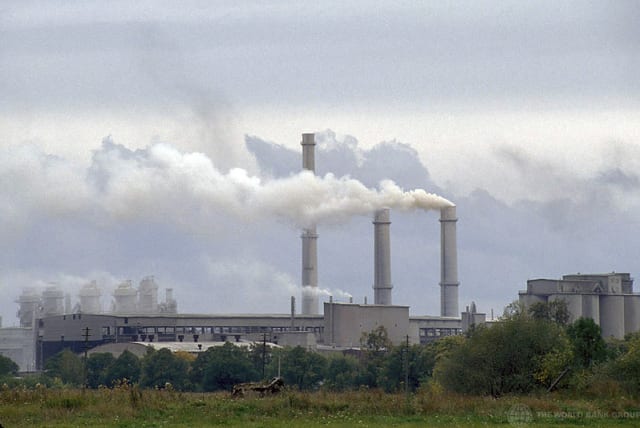Israel's biggest polluters: See who made the 'red list'

A new report identifies the most environmentally harmful factories in Israel.
According to a recent report by the Environmental Protection Ministry, ICL Rotem (formerly known as Rotem Amfert), a subsidiary of Israel Chemicals, stood out as the factory with the most detrimental environmental impact in Israel in 2021.
The report also reveals its impact was 3% more severe than the previous year.
The Environmental Impact Index - known as the "red list" - was published for the 11th time on Monday. This list compiles environmental risk information from public and government-owned industrial facilities, offering insights into the environmental performance and risks associated with publicly owned enterprises.
Purpose of the "red list"
The primary purpose of this list is to aid companies in adopting more responsible management practices. Additionally, it is a valuable resource for investors seeking to allocate their funds toward more sustainable and environmentally conscious businesses.
The runners-up on the top 10 list in this order were: Oil Refineries Ltd. (Bazan), Paz Ashdod Oil Refinery, Carmel Olefins Ltd., Elcon recycling center, Leviathan, the Dan Region Wastewater Treatment Plant (Shafdan), GADIV Petrochemical Industries Ltd., Orot Rabin power station and IMI Systems.
Regarding public companies, the index ranked the top three worst companies as ICL Group, ELECTRA and Bazan.
A report on emissions and other findings from 2022 will be published in September.
"Environmental risks translate directly into financial risks. Thanks to the Environmental Impact Index provided by the Ministry of Environmental Protection, investments in industrial companies - the institutional entities overseeing our pensions, savings, and investments - are equipped with robust tools for managing risks," said Idit Silman, the Minister of Environmental Protection. "Recognizing environmental risks is paramount as they can result in financial losses for both shareholders and bondholders of companies engaged in environmental pollution. These losses could erode the savings funds intended to support our retirements.
"Consequently, companies must prioritize adherence to principles of environmental responsibility," she continued. "They should work towards minimizing risks to public health and the environment, understanding that failure could have significant repercussions."
She added that the event list is predictable. These are all factories and companies that the ministry works with closely, and, in some cases, the public feels the impact of these companies' transgressions even without the report.
The ministry evaluated 45 publicly owned companies and 123 large industrial factories. According to the scoring method of the index, the higher the rating, the greater the negative environmental impact and environmental risks.
Over the past year, the ministry updated its methodology to streamline and enhance its effectiveness. Notable adjustments include a shift in the assessment of environmental non-compliance, focusing on infringements that have resulted in enforcement actions, unlicensed business operations, or unauthorized emissions and transfers to the environment.
Moreover, a positive element was introduced in the 2021 index: recognition of a company's commitment to upholding positive environmental principles.
Determining a company's or factory's environmental impact is grounded in various factors. These factors encompass emissions of pollutants into the air, sea, rivers, and soil; wastewater discharges; waste generation; utilization of hazardous materials; and the geographical sensitivity of the facility (which considers its proximity to densely populated areas and water sources). This data originates from the records stored in the Pollutant Release and Transfer Register.
Supervision and enforcement correspond to breaches of environmental protection laws and regulations identified through the monitoring and enforcement endeavors conducted by the Ministry of Environmental Protection. Environmental management contributes positively by assigning credits for voluntary initiatives to enhance environmental performance, such as implementing environmental management systems and the voluntary disclosure of environmental performance information.
The ICL Rotem factory scored 516 points, primarily influenced by administrative orders issued in 2021 due to violations, notably the excessive emission of pollutants into the air. Recently, ICL Group was mandated to pay NIS 115 million to the public and plaintiffs due to a class action lawsuit stemming from the Ashalom River incident in 2017. This catastrophe involved the release of hazardous acidic wastewater into the river from the Negev plant.
Bazan's score was lowered to 502 due to significant air pollution and a hazardous occurrence involving a benzene leak during a tank evacuation in 2020. Over the year, various other infractions were documented, prompting warnings related to deviations in air emissions and sea leakages, among other breaches.
The Ministry of Environmental Protection highlighted that financial regulators in numerous countries are expanding their environmental disclosure and risk management requirements, drawing parallels with initiatives like the European Union's Non-Financial Reporting Directive. By issuing this report, Israel aligns itself more closely with these global trends.
Silman acknowledged that a drawback of the report lies in its exclusive focus on public and government-owned entities, neglecting private companies, which also contribute significantly to environmental damage.
The Environment and Climate Change portal is produced in cooperation with the Goldman Sonnenfeldt School of Sustainability and Climate Change at Ben-Gurion University of the Negev. The Jerusalem Post maintains all editorial decisions related to the content.
Jerusalem Post Store
`; document.getElementById("linkPremium").innerHTML = cont; var divWithLink = document.getElementById("premium-link"); if (divWithLink !== null && divWithLink !== 'undefined') { divWithLink.style.border = "solid 1px #cb0f3e"; divWithLink.style.textAlign = "center"; divWithLink.style.marginBottom = "15px"; divWithLink.style.marginTop = "15px"; divWithLink.style.width = "100%"; divWithLink.style.backgroundColor = "#122952"; divWithLink.style.color = "#ffffff"; divWithLink.style.lineHeight = "1.5"; } } (function (v, i) { });

